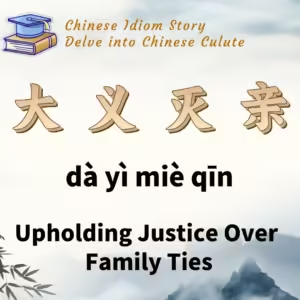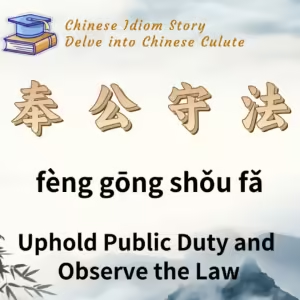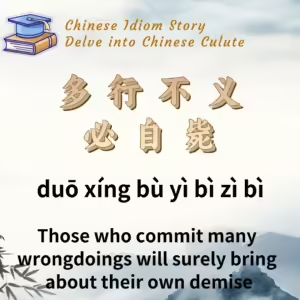
Chinese Idiom: 大义灭亲 (Da Yi Mie Qin)
English Translation: Upholding Justice Over Family Ties
pīn yīn: dà yì miè qīn
Idiom Meaning: This idiom means sacrificing personal or familial bonds to uphold righteousness and justice. “大义” refers to noble righteousness and justice, while “亲” refers to relatives.
Historical Source: “Zuo Zhuan,” Year Three of Duke Yin’s Rule.
Idiom Story:
During the Spring and Autumn period, the ruler of the State of Wei, Duke Zhuang, had a son named Zhou Xu, who was deeply favored by the Duke. Zhou Xu, feeling empowered, often bullied others, resorted to military aggression, and acted arrogantly. No one dared to oppose him. In his personal life, Zhou Xu was indulgent and hedonistic, engaging in debauchery without restraint. Duke Zhuang indulged him, failing to provide proper discipline.
One of the senior officials, Shi Que, observed these behaviors with concern. He worried that Zhou Xu would eventually cause great trouble. Shi Que advised Duke Zhuang, saying, “To truly love your son, you must discipline him and guide him onto the right path. Excessive indulgence will only foster arrogance, luxury, and debauchery, which are the roots of corruption.” However, Duke Zhuang ignored this advice.
As anticipated, disaster soon struck. After Duke Zhuang’s death, his elder son succeeded him and became known as Duke Huan of Wei. Zhou Xu, feeling envious and resentful, schemed to seize power. In 719 BC, Zhou Xu murdered Duke Huan and proclaimed himself the ruler. As a ruler, Zhou Xu was despotic and indulgent, cruelly exploiting and oppressing the people. The citizens of Wei could not endure his tyranny and began to rise against him. Zhou Xu, feeling insecure about his position, sought advice from the minister Shi Hou. Shi Hou, the son of Shi Que, had been complicit with Zhou Xu, ignoring his father’s counsel and committing numerous misdeeds.
Shi Hou suggested that they seek favor from Duke Huan of Chen, who was highly trusted by the King of Zhou. Since the states of Chen and Wei were on good terms, Shi Hou proposed that they personally visit Duke Huan of Chen to seek his intercession with the Zhou King, hoping this would stabilize their rule.
Zhou Xu found this plan agreeable and traveled to Chen with Shi Hou. Upon arrival, they were warmly received by Duke Huan of Chen. Acting courteously, Zhou Xu and Shi Hou entered Duke Huan’s hall, only to find it lined with armed guards. Duke Huan, sitting behind a grand table, sternly commanded, “Seize them!” The guards swiftly bound Zhou Xu and Shi Hou.
In shock and protest, Zhou Xu and Shi Hou demanded to know why they were being treated so disrespectfully. Duke Huan stood up and declared, “This letter is from your honorable elder statesman, Shi Que!” He then read aloud, “Zhou Xu and Shi Hou are the murderers of our ruler. I am too old to deal with them myself. They will soon arrive in your state. I implore you to capture and execute them to rid Wei of this great evil.”
Zhou Xu and Shi Hou were returned to Wei and subsequently executed. The author of “Zuo Zhuan” commented on this event, praising Shi Que as a righteous minister who despised Zhou Xu’s atrocities and his son’s complicity. Sacrificing familial bonds for the greater good of the state, Shi Que’s actions exemplified the idiom “大义灭亲.”
This story spread, and the idiom “大义灭亲” (upholding justice over family ties) became widely known.






